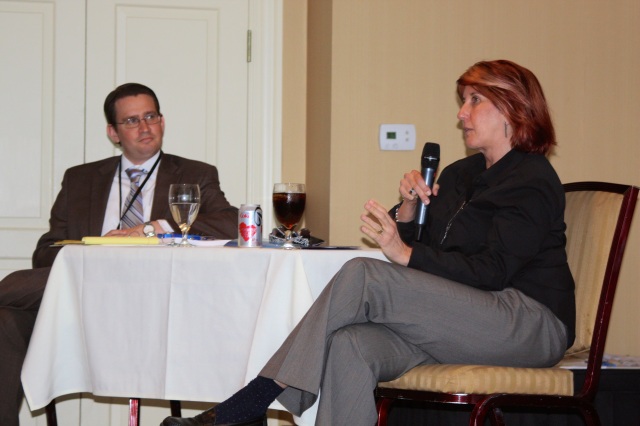Tampa Collaborative Divorce: Cordover Presenter at Training

Tampa Judge Catherine Catlin and Attorney Adam B. Cordover discuss Hillsborough County’s Collaborative Family Practice Administrative Order. Photo courtesy of Joryn Jenkins.
On March 22, 2013, Tampa Bay attorney Adam B. Cordover led a discussion, along with Tampa Family Law Associate Administrative Judge Catherine M. Catlin, on Hillsborough County’s Collaborative Family Practice Law Administrative Order. The panel took place at the 2013 Interdisciplinary Family Collaborative Practice Training, co-sponsored by the Collaborative Divorce Institute of Tampa Bay and the Tampa Bay Collaborative Divorce Group. Over 70 attorneys, mediators, financial professionals, and mental health professionals from throughout Florida and as far away as Pennsylvania and Texas were in attendance.
Collaborative family law is a process that takes private issues such as divorce and child custody out of the public courtroom and into secure and confidential offices of professionals. Once a collaborative participation agreement is signed, attorneys dedicate themselves solely to achieving an agreement acceptable to both parties rather than preparing for court battles. The Collaborative facilitator helps the parties focus on the future of the family and children rather than the demons of the past, while a financial professional develops personalized options for the division of assets and debts and the family’s financial security.
The administrative order ensured that the Thirteenth Judicial Circuit in and for Hillsborough County encouraged and recognized the use of the collaborative process and permitted divorce and family law cases that had already been filed in the court system to convert to collaborative cases.
If you have questions on how a Tampa Bay collaborative process can help your family law matter, schedule a consultation with a Florida collaborative attorney by calling The Law Firm of Adam B. Cordover, P.A., at (813) 443-0615 or filling out our contact form.
Adam B. Cordover serves as Vice President of the Collaborative Divorce Institute of Tampa Bay and is a member of the International Academy of Collaborative Professionals. Adam served on the taskforce that drafted the Hillsborough County collaborative family practice administrative order.

